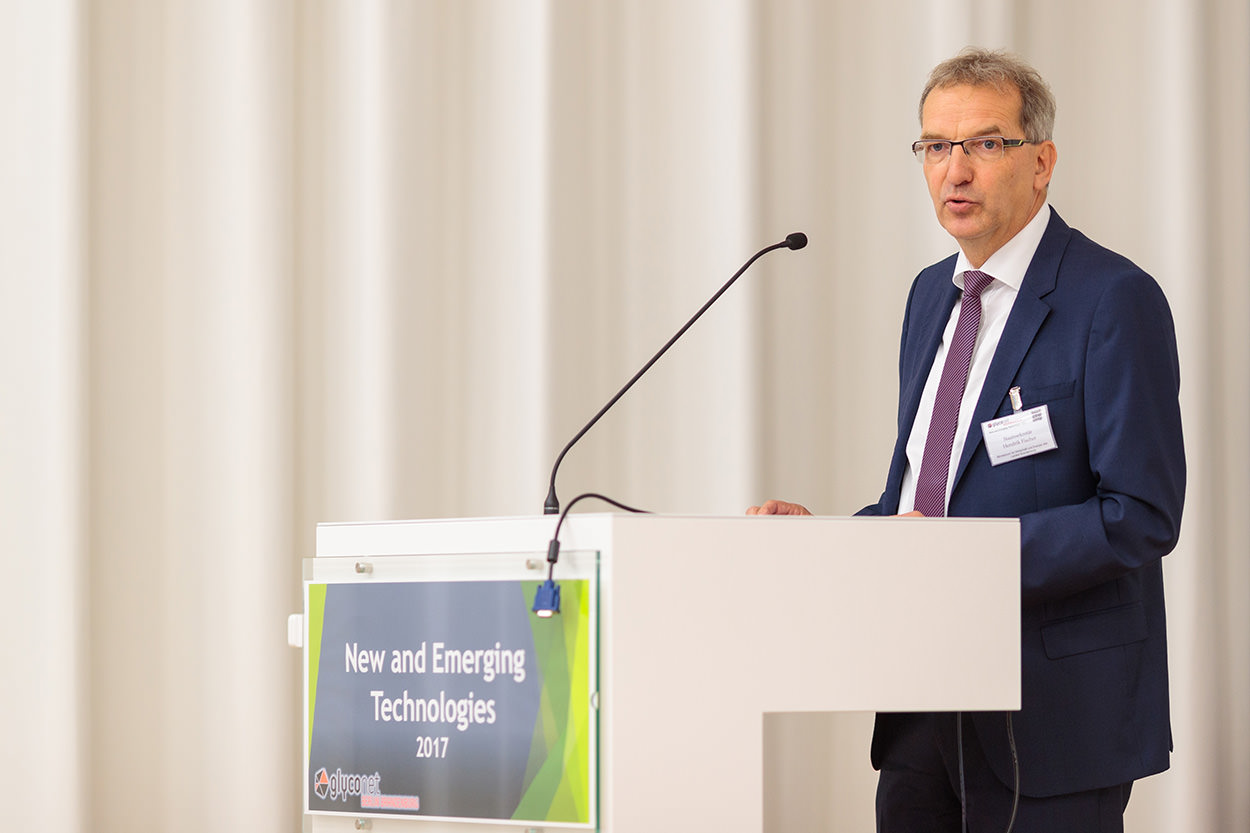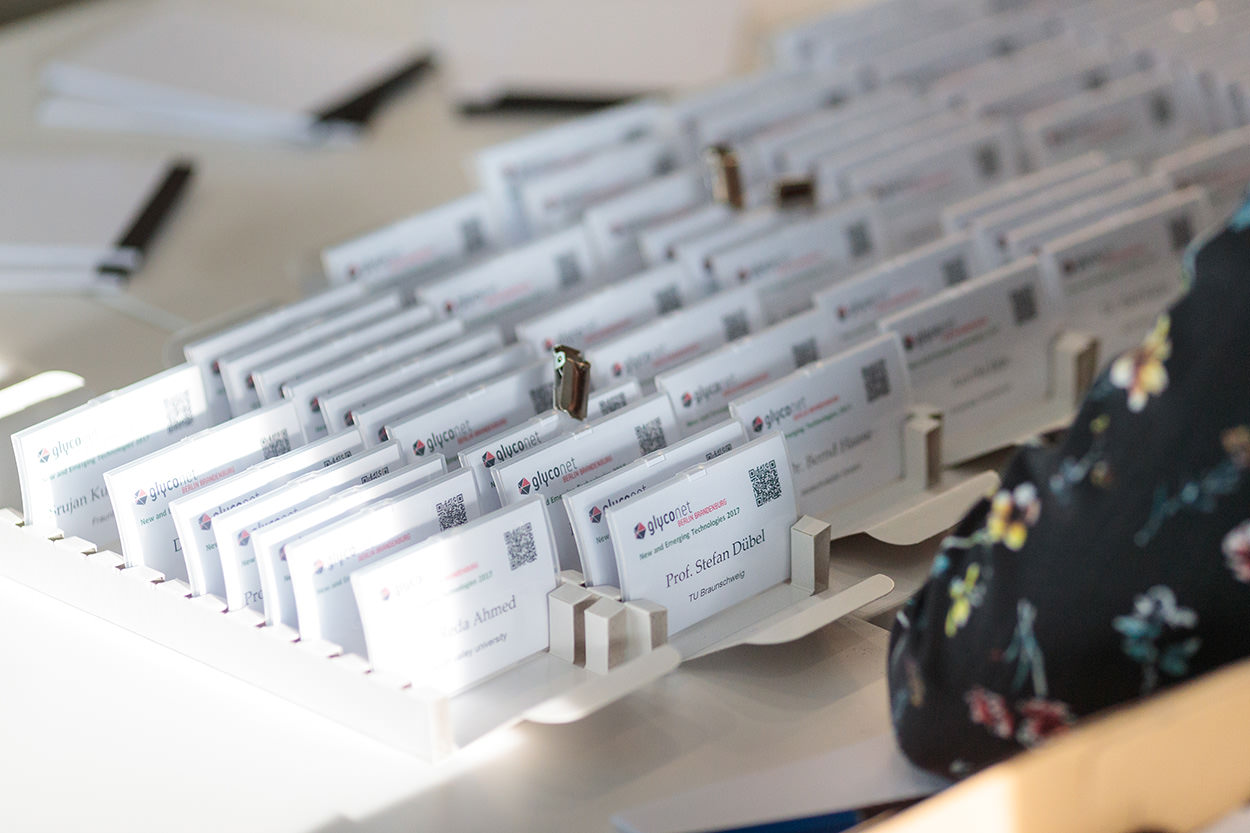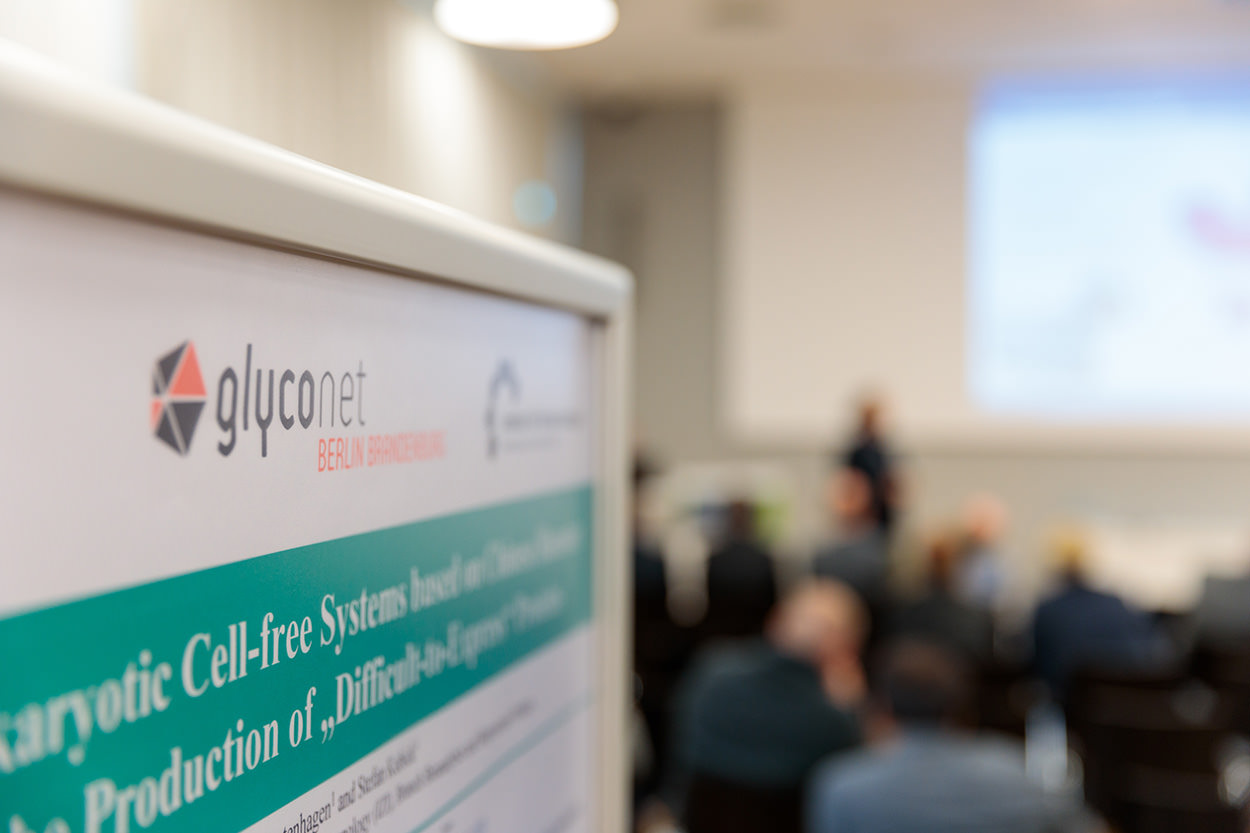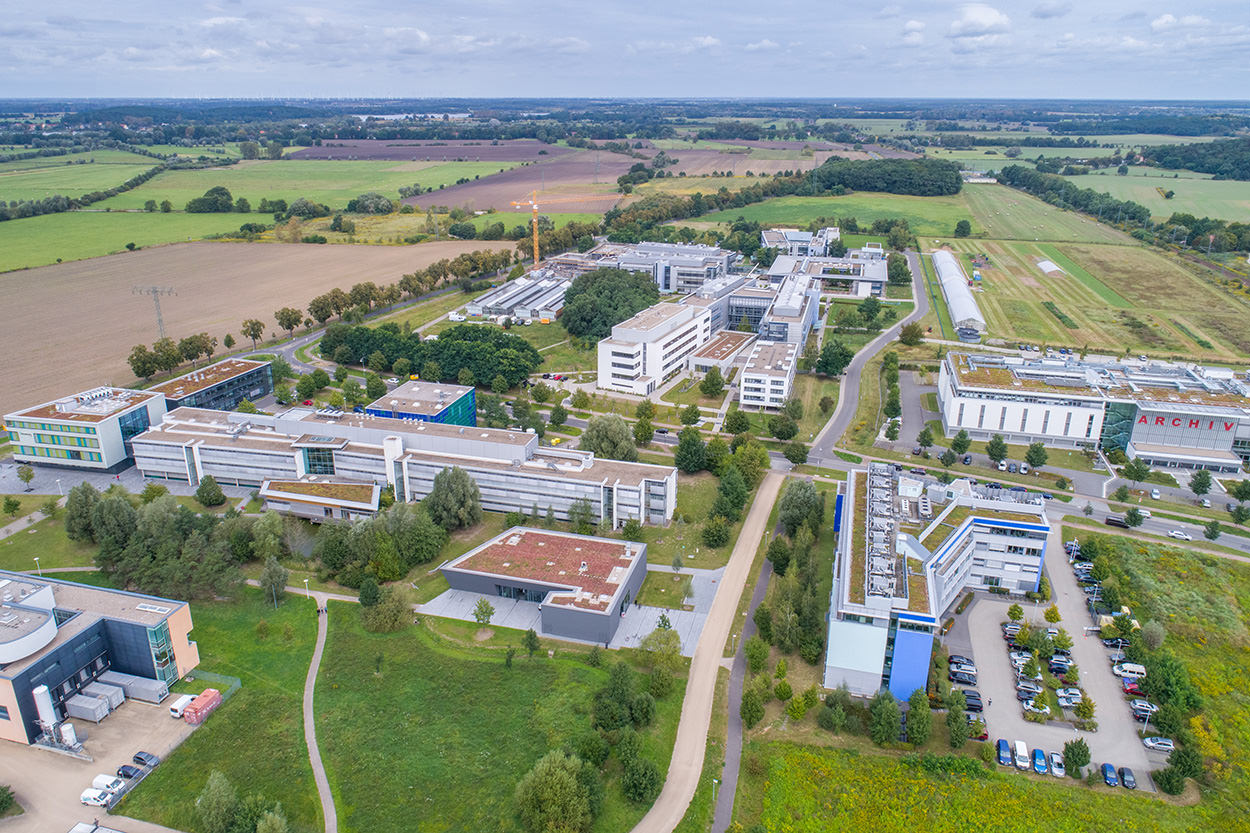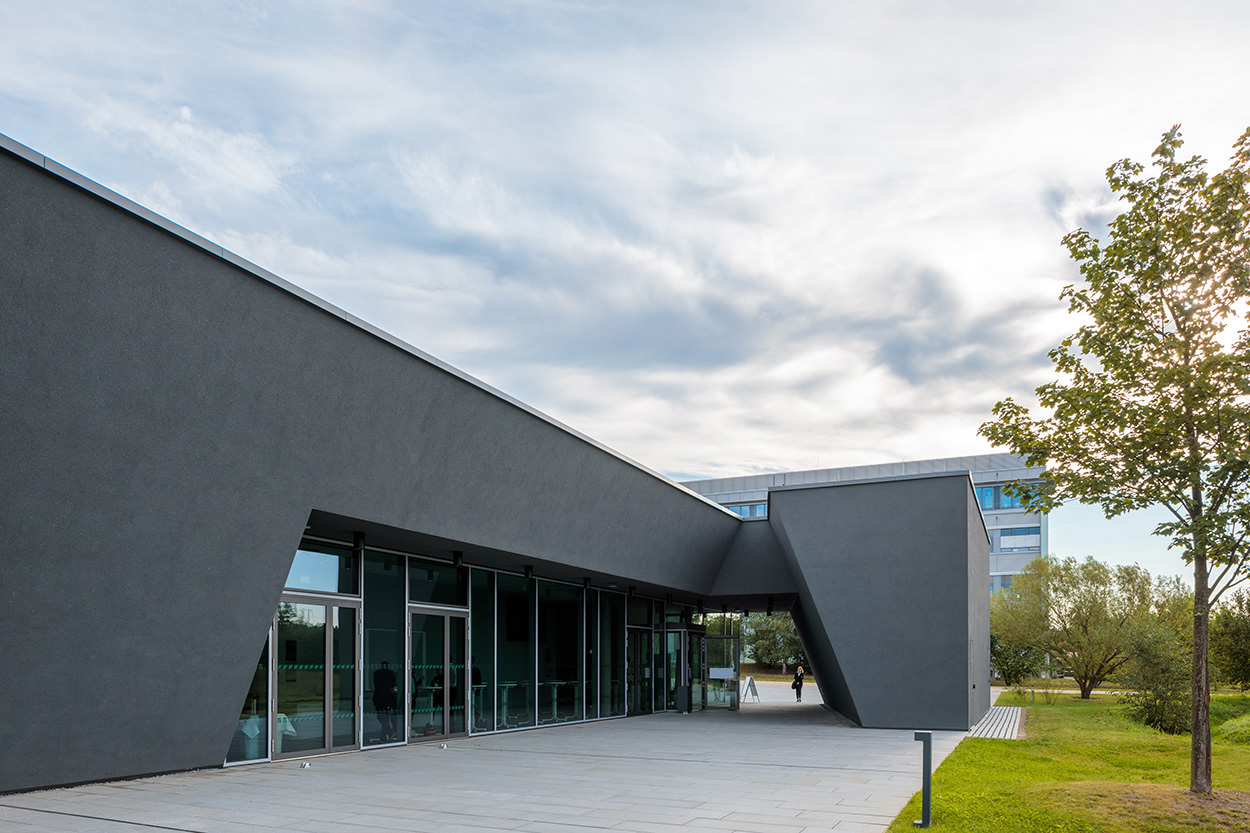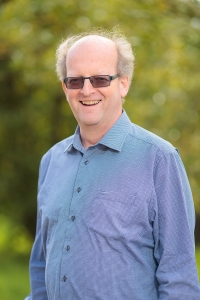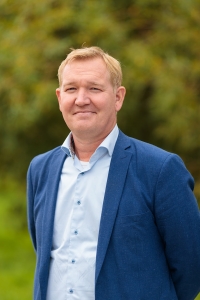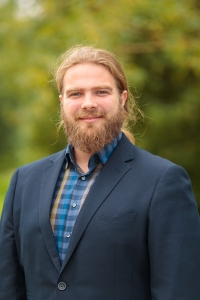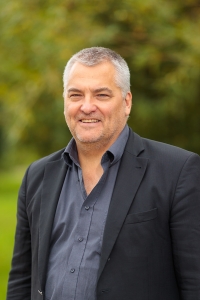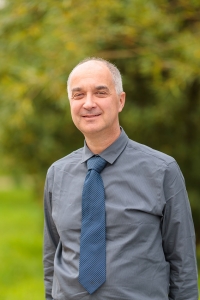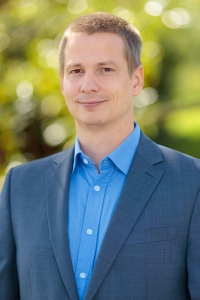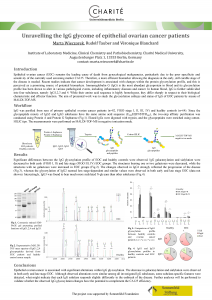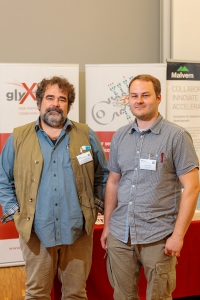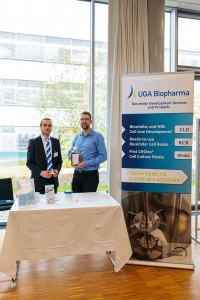New and Emerging Technologies 2017
The 2017 conference on „New and Emerging Technologies“ provided a platform for international scientific exchange and showcases the newest developments in glycobiotechnology, biochemistry, molecular biology, biofunctional materials, antibody technologies, synthetic biology and related areas.

Photo: Reinhardt & Sommer
Stefan Kubick
The Fraunhofer Institute for Cell Therapy and Immunology IZI investigates and develops solutions to specific problems at the interfaces of medicine, life sciences and engineering.
One of the institute’s main tasks is to conduct contract research for companies, hospitals, diagnostic laboratories and research institutes operating in the field of biotechnology, pharmaceuticals and medical engineering. Its areas of competence lie in cell biology, immunology, drug biochemistry, biomarker, bioanalytics and bioproduction as well as process development and automation.
The Bioanalytics and Bioprocesses Branch in Potsdam-Golm (Fraunhofer IZI-BB) works on technological solutions for biomedicine and diagnostics as well as for biotechnology and bioproduction.
Research units at the department of Cell-free and Cell-based Bioproduction exploit novel cell-free protein synthesis systems as a versatile tool for functional genomics, e.g. cell-free synthesis of membrane proteins and glycoproteins, as well as chip-based protein synthesis and translational regulation.
Contact
Dr. Stefan Kubick
Chairman glyconetBB
Head of Department
Cell-free and Cell-based Bioproduction
Fraunhofer Institute for Cell Therapy and Immunology (IZI),
Branch Bioanalytics and Bioprocesses Potsdam-Golm (IZI-BB)
Science Campus Golm
Am Mühlenberg 13
14476 Potsdam
Phone: +49 (0)331-58187.306
E-Mail: Stefan.Kubick(at)izi-bb.fraunhofer.de
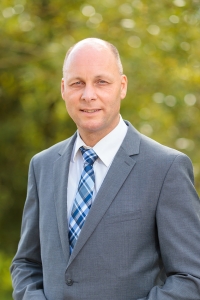
Photo: Reinhardt & Sommer
Lars Stöckl
About Glycotope:
Glycotope, founded in 2000 in Berlin, focuses on the development of innovative immune-oncological products for the treatment of various cancer types using their GlycoBody and GlycoExpress® technologies. Glycotope has currently two product in advanced clinical development. The Company’s additional pipeline includes preclinical non-antibody and antibody biopharmaceuticals for various indications.
Glycotope’s GlycoExpress® (GEX®) platform allows glyco-optimization and high yield production of a variety of fully human glycosylated biopharmaceuticals such as antibodies, glycoprotein hormones, coagulation factors and cytokines, and by using a toolbox of glyco-engineered proprietary human cell lines that allow for optimization of a whole series of different determining sugars. In addition, the GEX® platform can be used for in process glycosylation control.
Contact
Dr. Lars Stöckl
Glycotope GmbH
Robert-Roessle-Str. 10
13125 Berlin, Germany
E-Mail: contact(at)glycotope.com
Telefon: +49 (0) 30 9489 2600
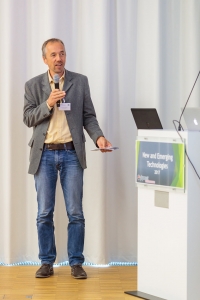
Photo: Reinhardt & Sommer
Detlev Suckau
Dr. Detlev Suckau is Global R&D manager at Bruker Daltonics for Biopharmaceutical Solutions. He is responsible for the development of new analytical workflows utilizing Bruker mass spectrometers, software and automation. Current research interests comprise Top-Down protein sequencing, PTM identification and quantification such as glycoprotein analysis and disulfide bond analysis. More recently, methods to utilize the MALDI-TOF speed for industrial applications play a significant role in his research, including clone selection based on glycan profiles.
He graduated in Chemistry from the University of Constance in 1991 developing new methods to characterize epitopes and surface topology of proteins by MS and took a PostDoc position at Cornell Univ., Ithaca, NY, USA with Fred McLafferty determining protein confirmations by H/D exchange in the gas phase of an FTMS. After one year in Analytics Dept. to support pharmaceutical drug development at Boehringer Mannheim he joined Bruker Daltonik in 1994.
He published or co-authored more than 40 peer reviewed papers in mass spectrometry and is Co/inventor of 8 patents.
Contact
Dr. Detelv Suckau
Bruker Daltonik GmbH
Fahrenheitstr. 4
28359 Bremen, Germany
Phone: +49 (0)421 2205-0
e-Mail: Service.BDAL.DE@bruker.com
Benjamin Müller
Biofidus is a bioanalytical company located in Bielefeld, Germany. Its services include a wide variety of bioanalytical methods such as spectroscopic, chromatographic, and mass spectrometric assays focused on characterization of proteins as well as small molecules. Biofidus is specialized in the characterization of biopharmaceuticals or biosimilars, including but not limited to monoclonal antibodies, Fc-fusion proteins, erythropoietin, and ADCs. Additionally, Biofidus offers spent media analysis for fermentation and cell culture technology, which includes the analysis of amino acids, metabolites, and vitamins in culture media. The analytical service also includes the development of custom tailored and novel client-specific assays.
Contact
Dr. Benjamin Müller
Chief Executive Officer
Biofidus AG
Hainteichstrasse 78
33613 Bielefeld, Germany
T +49 (0)521 999 89 400
M +49 (0)160 97 855 857
F +49 (0)521 999 89 409
E-Mail: benjamin.mueller@biofidus.de
Website: www.biofidus.de

Photo: Reinhardt & Sommer
Frederik Olsson
Genovis develops and manufactures novel enzymes and unique solutions for protein characterization and analysis. The propriety product portfolio consists of more than a dozen unique enzyme families used within the field of biopharmaceutical development spanning from discovery to production of clinical material. Enzymes developed and produced by Genovis conatins specific IgG proteases as well as other proteomics proteases and glycosidases. The company has well-equipped facilities in which to conduct efficient product development in the early research phase, as well as subsequent development of production processes and the final product format. An important cornerstone and competitive advantage of Genovis’ R&D activities is collaboration with academic groups that focus on characterizing new enzymes. Just as valuable is the customer relationship that enables product development to meet the ever-changing customer needs.
Contact
Frederik Olsson
CEO
Genovis AB
Box 790
SE-220 07 Lund
Sweden
Phone: +46 (0)46 10 12 33
Mobile: +46 (0)702 76 46 56
Bram Heijs
“Mass spectrometry imaging (MSI) is a technology that simultaneously provides the spatial distribution of hundreds of biomolecules directly from tissue. Using essentially the same technique, and by slightly adapting sample preparation strategies, a wide pallet of molecular classes will be amenable for MSI analysis: small molecules (metabolites, pharmaceuticals), lipids, N-linked glycans, and proteins (intact, proteolytic fragments). The MSI analysis leads to minimal loss of histological information, and so the same tissue section may be histologically assessed and registered to the MSI datasets. In this manner the mass spectral signatures of specific cell types or histopathological entities, e.g. tumor cells, may be extracted from pathological tissue samples. This high cellular specificity is behind the increasing popularity of MSI in clinical research, and its proven ability to identify diagnostic and prognostic biomarkers.
The Mass Spectrometry Imaging group, part of the Center for Proteomics & Metabolomics of the Leiden University Medical Center, focuses on methodology development to address unmet clinical needs. Particular areas of clinical focus are the (clonal) evolution of tumors and their impact on patient diagnosis, prognosis and treatment response; tumor metabolism and microenvironment; neurological disorders (both episodic, such as migraine, and permanent). The group is also at the forefront of efforts to better standardize and validate MSI methods for clinical research, so that these power, complementary molecular histological methods may be routinely applied.”
Contact
Bram Heijs
Mass Spectrometry Imaging
Center for Proteomics and Metabolomics
Leiden University Medical Center
Postzone S3-P
P.O. Box 9600
2300 RC Leiden
The Netherlands
Phone: +31 (0)71 52 6415
E-Mail: b.p.a.m.heijs(at)lumc.nl
Sophia Schönhals
Malvern Instruments’ systems are used by scientists and engineers in a wide range of industries and organisations to solve the challenges associated with maximizing productivity, developing better quality products and getting them to market faster. Malvern’s analytical instruments address a wide variety of measurement needs, and they help users accelerate their research and better understand the materials they work with. These materials range from proteins and polymers in solution, particle and nanoparticle suspensions and emulsions, through to sprays and aerosols, industrial bulk powders and high concentration slurries. Understanding the properties of materials is fundamental to predicting how products will behave during use, optimizing their performance and achieving manufacturing excellence.
Malvern’s analytical toolkit for small molecule applications e.g., supports the characterization of active pharmaceutical ingredients and excipients for innovator and generic drug development. Used throughout drug discovery, formulation development and pharmaceutical manufacturing, Malvern’s combination of complementary techniques helps to progress drugs more rapidly through the development pipeline.
Malvern’s specific toolbox for biopharmaceutical development e.g., addresses the specific analytical challenges of this field, where biomolecule stability and successful formulation are paramount. Proven solutions tailored to the needs of biological molecules are complemented by groundbreaking new technologies. This evolving suite of instruments delivers an array of biophysical information, helping reduce risk and increase efficiency.
Contact
Sophia Schönhals
Malvern Instruments GmbH
Marie-Curie-Str. 4/1
71083 Herrenberg, Germany
Phone: +49 (0) 30 53081627
E-Mail: Sophia.Schoenhals(at)malvern.com
Web www.malvern.com/de
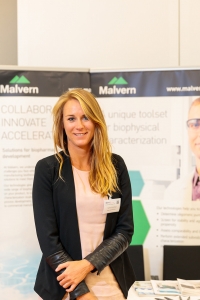
Photo: Reinhardt & Sommer
Marc Ehlers
The laboratory of Prof. Dr. Marc Ehlers investigates the development and function of differently Fc glycosylated antibodies in humans and mice. Low galactosylated IgG antibodies are associated with pro-inflammatory effector functions like IgG autoantibodies in patients with rheumatoid arthritis. Instead, galactosylated plus terminal sialylated IgG antibodies show less inflammatory or even immunosuppressive effector functions. The lab of Prof. M. Ehlers investigates the T and B cell differentiation leading to plasma cells producing differently glycosylated antibodies in the context of autoimmunity, allergy and vaccination. Serum IgG (subclass) glycosylation is investigated by different methods. In addition, the laboratory is producing monoclonal antibodies with opposite glycan patterns and investigates their activating or inhibitory functions and receptor complexes in the context of different diseases in mice. The laboratory will be happy about further cooperations.
Ausgewählte Publikationen der Arbeitsgruppe: Oefner et al, J Allergy Clin Immunol 2012 (https://doi.org/10.1016/j.jaci.2012.02.037); Hess et al, J Clinic Invest 2013 (https://doi.org/10.1172/JCI65938); Epp et al, J Allergy Clin Immunol 2018 (https://doi.org/10.1016/j.jaci.2017.06.021).
Contact
Prof. Dr. rer. Nat. Marc Ehlers
Laboratories of Immunology and Antibody Glycan Analysis
Institute for Nutrition Medicine
University of Lübeck
Ratzeburger Allee 160
23562 Lübeck, Germany
E-Mail: marc.ehlers@uksh.de
https://www.uksh.de/Ernaehrungsmedizin_Luebeck/
Kevin Yarema
Kevin J. Yarema heads the Laboratory of Cell and Carbohydrate Engineering
in the Department of Biomedical Engineering at The Johns Hopkins University
(Baltimore, Maryland, USA). His group’s research is focused largely on
understanding and manipulating metabolic flux through glycosylation pathways
involved in diseases characterized by abnormal glycosylation (e.g., cancer,
cardiovascular disorders, arthritis, and degenerative muscle disease). In
particular, his group is a pioneer in deploying „metabolic glycoengineering“
(MGE) technology, which involves the biosynthetic incorporation of
non-natural monosaccharide analogs into cellular glycans, to develop new
carbohydrate-based therapies for these diseases. In a complementary research
direction, his team has developed novel MGE-acting sugar analogs whose
structure activity relationships promote high metabolic flux through
biosynthetic pathways for glycoconjugate production in a way that
constitutes an enabling technology for improving recombinant glycoprotein
production, biological activity, and pharmacological properties.
Contact
Kevin Yarema, PhD
Associate Professor
Johns Hopkins University
Laboratory of Cell and Carbohydrate Engineering
3400 N. Charles Street
Baltimore, MD 21218, USA
E-Mail: kyarema1(at)jhu.edu
Stefan Dübel
The Department of Biotechnology of the Institute for Biochemistry, Biotechnology and Bioinformatics at Braunschweig University covers a broad range of fundamental and applied research topics centered about discovery and molecular engineering of recombinant human antibodies and in vitro evolution. First, antibodies are discovered from our billion-clone libraries by recombinant methods. Using the power of in vitro display technologies, antibodies can be generated with pre-defined biochemical properties and to targets not amenable to animal-based antibody generation. But this is just the start: in analogy to the engineering of machines, antibodies and other protein domains are designed, assembled at the molecular level, tuned and adapted to achieve specific functions in biological systems or technical applications.
This allowed us to contribute to infection biology, cancer research, diagnostic test development, intrabody application, developmental biology, biomarker and drug discovery, synthetic biology, biochemical engineering and process development. A substantial list of successful technology transfers proves the significance of our research for society, by avoiding animal experiments and providing new ways to develop designer medications of the 21st century.
Contact
Prof. Dr. Stefan Dübel
Technische Universität Braunschweig
Institute of Biochemistry
Biotechnology and Bioinformatics
Spielmannstr. 7
38106 Braunschweig, Germany
Phone: +49 (0)531-391-5731
E-Mail: biotech(at)tu-bs.de
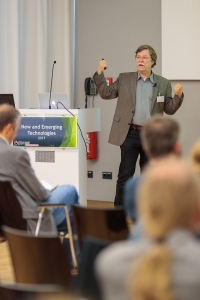
Photo: Reinhardt & Sommer
Marlitt Stech
The research group “Cell-free Protein Synthesis” uses cell-free systems based on eukaryotic cell lysates as new strategy for the efficient and reliable synthesis and characterization of antibodies. Compared to conventional methods used for the generation of these proteins, enormous time savings and cost efficiency can be achieved by using cell-free systems as expression and screening platform. Furthermore, these open eukaryotic in-vitro translation systems provide enormous potential for modifications and improvements of the quality and characteristics of cell-free manufactured proteins. One potentially pharmacologically-relevant application, for example, is offered by the cell-free synthesis of antibody-drug conjugates and immunotoxins.
Contact
Dr. Marlitt Stech
Cell-free and Cell-based Bioproduction
Fraunhofer Institute for Cell Therapy and Immunology (IZI)
Branch Bioanalytics and Bioprocesses (IZI-BB), Potsdam
Science Campus Golm
Am Mühlenberg 13
14476 Potsdam, Germany
E-Mail: marlitt.stech@izi-bb.fraunhofer.de
Telefon: +49 (0) 331 58187-305
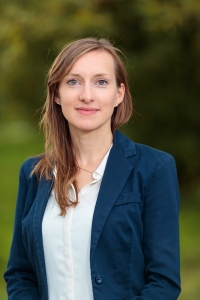
Photo: Reinhardt & Sommer
Benjamin Müller
YUMAB is a privately-held German biotechnology company that provides tailored solutions for your human antibody development and antibody engineering problems. We provide rapid, large-scale discovery and optimization of human monoclonal antibodies, custom libraries, antibody engineering (e.g., humanization, affinity maturation, various antibody product formats), and custom-made antibodies to difficult antigen targets. YUMAB offers fee-for-service solutions, and attractive and flexible licensing options for diagnostics and therapeutics.
YUMAB’s advanced in vitro antibody phage display selection technology and proprietary, highly-diverse human antibody gene libraries (>1.5×1010) have successfully provided desirable antibody candidates to our numerous academic and pharmaceutical industry clients. Several of these candidates have advanced to therapeutic lead development.
Our successes result from the more than 20 years of experience in recombinant antibody research and development. YUMAB’s founders including Prof. Dr. Stefan Dübel – co-inventor of antibody phage display – have an outstanding track record in academic and industrial research.
Contact
Dr. Philip Kuhn
YUMAB GmbH
Inhoffenstr. 7
38124 Braunschweig, Germany
Phone: +49 (0) 531 3804 270
E-Mail:info(at)yumab.com
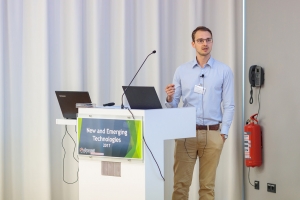
Photo: Reinhardt & Sommer
Günter Roth
The research group from Dr. Günter Roth (University Freiburg, Center for Biological Systems Analysis – ZBSA, Germany) invented a microarray copying technique, enabling to copy a DNA microarrays into either DNA, RNA or protein microarrays. Direct after the copy process the finished microarray can be analysed label-free and in real-time for binding kinetics against any given target molecule (https://www.youtube.com/watch?v=tugTLtJaUwQ).
Cell-free mixes are used to realize the DNA to protein microarray copies. Future applications of the microarray copying will be the copying of phage display pools especially with the focus onto protein binders and signalling interactions.
Contact
Dr. Günter Roth
Center for Biological Systems Analysis
University of Freiburg
Habsburgerstr. 49
79104 Freiburg, Germany
Phone: +49 (0) 761 203-97167
E-Mail: guenter.roth(at)zbsa.uni-freiburg.de
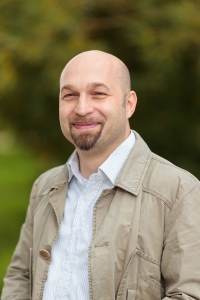
Photo: Reinhardt & Sommer
Liliana Berezkinová
Nanopharma is a Czech nanomaterial engineering company dedicated to development and commercialization of nanofiber-based technologies and products.
Having a portfolio of over thirty different nanofiber structures, Nanopharma is involved heavily in both academic and industrial projects with its main focus being tissue engineering, cell culture, transdermal and topical drug delivery, implantology and cosmetics.
Nanopharma acts as a contract development partner to a number of medical device and pharmaceutical companies and participates in multiple research consortia (e.g. H2020).
Furthermore, the company is currently marketing two proprietary product lines: NanoMatrix3D® – a line of standardized and ready-to-use nanofiber scaffolds for cell culture, stem cell research and molecular biology and – a new addition – [n]fibrecare – a line of dry sheet nanofibre masks launching on Kickstarter in March 2018.
Nanopharma initiated establishment of two significant Czech clusters – Nanoprogress and CzechImplant, both of which are collaborative platforms for nanotechnology and implantology research, respectively.
Contact
Liliana Berezkinová, CEO
Ukrajinská 1488/10
101 00 Praha 10
E-Mail: berezkinova(at)nanopharma.cz
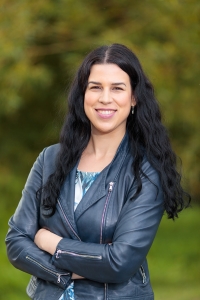
Photo: Reinhardt & Sommer
Michael Heymann
Time-resolved mix-and-inject serial crystallography combines structural analysis with chemical kinetics to track enzyme catalysis ‘in action’, since the structure of transient states and kinetic mechanisms can be determined simultaneously. These experiments exploit diffusion of a substrate into sample crystals to initiate a reaction and the life-time of a transient reaction intermediate is determined by both the mixing dynamics and the time that the crystals need to travel from the mixing point to the x-ray interaction region. Due to diffusion limited influx of substrate into the crystals, small (nanometer to micrometer sized) crystals are required to achieve millisecond time resolution. We developed a suite of microfluidic methods that utilize high precision 3D printing to overcome long standing challenges in growing and in delivering nano-crystals into the X-ray interaction region of both free-electron lasers and synchrotron sources. Directly imaging catalytic intermediates at the crossover from transition state kinetics to steady state kinetics holds great potential to advance our knowledge of the mechanisms and dynamics of reactions catalyzed by enzymes to inform enzyme design, structure-based drug design, and bio-process engineering.
Contact
Dr. Michael Heymann
Department of Cellular and Molecular Biophysics (Schwille lab)
Max Planck Institute of Biochemistry
Am Klopferspitz 18
82152 Martinsried, Germany
E-Mail: heymann(at)biochem.mpg.de
Telefon: +49 (0) 89 8578-2360
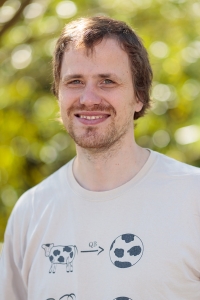
Photo: Reinhardt & Sommer
Lothar Elling
Professor’s Elling research focus lies in the area of glycobiotechnology/biocatalysis regarding the topics; Combinatorial biocatalysis: Enzyme tool box for cascade reactions for the synthesis of glycoconjugates with in situ regeneration of nucleotide sugars; Synthesis of glycoconjugates as biomolecular recognition structures for carbohydrate-protein interactions; Biofunctionalization of biomaterial surfaces; Development of diagnostic platform technologies for the detection of disease-related glycosylation defects.
Contact
Prof. Dr. rer. nat. Lothar Elling
RWTH Aachen University
Laboratory for Biomaterials
Institute for Biotechnology and
Helmholtz Institute for Biomedical Engineering
Pauwelstrasse 20
52074 Aachen, Germany
Phone: +49 (0) 241-80-28350/-24176
E-Mail: L.Elling(at)biotec.rwth-aachen.de
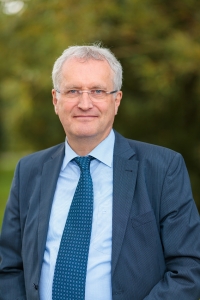
Photo: Reinhardt & Sommer
Ruben R. Rosencrantz
The division Functional Proteinsystems/Biotechnology at Fraunhofer IAP
focusses on the incorporation of biomolecules in materials. Especially
of interest are interactions taking place at the materials surface: the
biointerface. Glycans as nature’s way of surface coating are
biomolecules which exhibit one of the geatest variety of different
functionalities in nature. We use glycans for integration into polymers
or as functional surface coatings. This allows us to create new tailored
materials with a broad range of applications. These materials enable
fast diagnostics and scavanging of pathogens, encapsulation for drug
delivery, low-adsorption surfaces or functional coatings in cell
culture, to name just a few. By combining nature’s functionalities
encoded in biomolecules like glycans with the possibilities of modern
programmable and functional materials the Fraunhofer IAP wants to break
new grounds in polymer science.
Contact
Dr. Ruben R. Rosencrantz
Fraunhofer Institute for Applied Polymer Research IAP
Geiselbergstraße 69
14476 Potsdam-Golm
Phone: +49 (0) 331 / 568 3203
E-Mail: ruben.rosencrantz(at)iap.fraunhofer.de
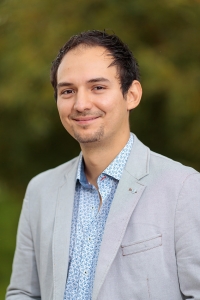
Photo: Reinhardt & Sommer
Anne Zemella
The finite number of twenty amino acids limits their biochemical and biophysical characteristics. Our research is based on
a procedure to incorporate chemically modified amino acids with diverse reactive groups into cell-free synthesized proteins at a chosen position. Therefore the amber suppression technology is utilized. We enable the coupling of fluorescence dyes, sugar moieties, PEGylation and biotinylation to the reactive group of the incorporated amino acid by click chemistry. In particular our approach can be further utilized to determine specific conformations of membrane proteins as well as for screening of novel ligands and therapeutics.
Contact
Anne Zemella
Cell-free and Cell-based Bioproduction
Fraunhofer Institute for Cell Therapy and Immunology (IZI)
Branch Bioanalytics and Bioprocesses (IZI-BB), Potsdam
Science Campus Golm
Am Mühlenberg 13
14476 Potsdam, Germany
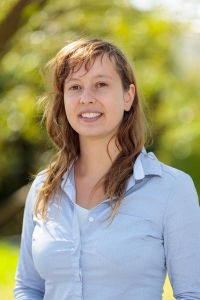
Photo: Reinhardt & Sommer
Ralf Kühn
Gene editing for disease modeling and gene therapy
Gene editing using CRISPR/Cas9 greatly facilitates engineering of the mouse and human genome in zygotes or iPS cells and opens new opportunities in disease modeling and correction. To this end we use CRISPR/Cas9 for generating mouse disease models, human iPS cell models and aim to shift DSB repair towards higher levels of homology-directed repair to facilitate model generation and gene therapy. In human induced pluripotent stem cells (hiPSCs) we use CRISPR/Cas to investigate human genetic disease mechanisms. The research group on hiPSC -based disease modeling is setting up a technology platform enabling the engineering, differentiation and phenotyping of hiPSCs. The lab is presently focusing on the optimisation of CRISPR/Cas induced mutagenesis in hiPSCs and their directed differentiation into dopaminergic neurons.
Contact
Dr. Ralf Kühn
Max-Delbrück-Centrum für Molekulare Medizin (MDC)
Robert-Rössle-Str. 10
13092 Berlin, Germany
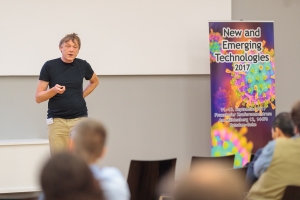
Photo: Reinhardt & Sommer
Michael C. Jewett
Repurposing the translation apparatus for synthetic biology
Imagine a world in which we could adapt biology to manufacture any therapeutic, material, or chemical from renewable resources, both quickly and on demand. Industrial biotechnology is one of the most attractive approaches for addressing this need, particularly when large-scale chemical synthesis is untenable. Unfortunately, current approaches to engineering organisms remain costly and slow. This is because cells themselves impose limitations on biobased product synthesis. It is difficult to balance intracellular fluxes to optimally satisfy a very active synthetic pathway while the machinery of the cell is functioning to maintain reproductive viability. Further, chemical reactions take place behind a selective barrier, the cell wall, which limits sample acquisition, monitoring, and direct control. In addition, cells are adapted to a relatively simple chemical operating system (i.e., a few common sugars, 20 amino acids), which presents researchers a limited set of accessible molecules with which to work. In this presentation, I will discuss my group’s efforts to overcome these limitations and widen the aperture of the traditional model of biotechnology. In one direction, we seek to create a new paradigm for engineering biocatalytic systems using cell-free biology. In another area, we are catalyzing new directions to repurpose the translationapparatus for synthetic biology. Our new paradigms for biochemical engineering are enabling a deeper understanding of why nature’s designs work the way they do, as well as opening the way to novel biobased products that have been impractical, if not impossible, to produce by other means.
Contact
Michael C. Jewett
Charles Deering McCormick Professor of Teaching Excellence
Associate Professor, Department of Chemical and Biological Engineering
Co-director, Center for Synthetic Biology
Northwestern University
E-Mail: m-jewett(at)northwestern.edu
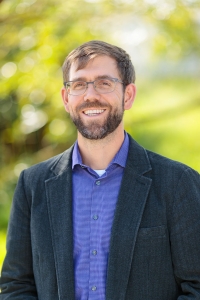
Photo: Reinhardt & Sommer
Nediljko Budisa
The Group of Professor Budisa is well known internationally as a leading team in genetic-code engineering and most recently in chemical synthetic biology (Xenobiology). The research focuses on the development of in vivo methods for introducing genetically-encoded protein modifications in individual proteins, complex protein structures and whole proteomes with the goal to create synthetic cells. The group has also published in the research field of molecular evolution, in particular on the mechanisms and principles of genetics code evolution. They made significant contributions by publishing in the following research areas. (1) Genetic code engineering/expansion for ribosomal translation, synthetic chemistry of unnatural amino acids, fluorine biochemistry, synthetic biology of bio-orthogonal chemistries. (2) Applications of an expanded genetic code to study protein stability/folding, multivalent binding, conformational dynamics, electrostatics, proton and electron transfer & optical properties. (3) Bio-expression of genetically encodable peptide-based drugs and complex biomaterials. (4) Directed evolution of enzymes and bacterial strains & metabolic engineering for artificial biological diversity and technologies derived therefrom. Prof. Budisa also tries to estimate possible societal, ethical and philosophical impacts these scientific and technological achievements.
Contact
Prof. Dr. Nediljko Budisa
Technische Universität Berlin
Fakultät II
Institut für Chemie
Sekretariat L 1
Müller-Breslau-Str. 10
10623 Berlin
E-Mail: budisa(at)chem.tu-berlin.de
Telefon: +49 30 314 28960
Telefax: +49 30 314 28279
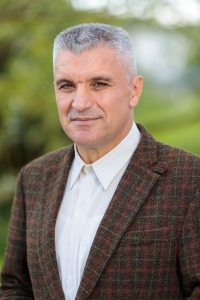
Photo: Reinhardt & Sommer
An-Ping Zeng
The Institute of Bioprocess and Biosystems Engineering headed by Prof. An-Ping Zeng at Hamburg University of Technology (TUHH) (http://www.tuhh.de/ibb/) has more than 30 years extensive research experience in biochemical engineering, integrated bioprocesses including product separation, metabolic engineering, systems and synthetic biology for chemicals, fuels and pharmaceuticals using microbial and mammalian systems. Present research especially focuses on (1) Design and optimization of biomolecules, metabolic pathways and cells with computational, evolutionary, machine learning and automated HTS approaches for new bioprocesses and products; (2) Study of multienzymatic reaction cascades for novel biosynthesis; (3) Integrated next generation bioprocesses including bioelectrochemical systems for C1-Bioeconomy (use of CO2, formic acid etc).
Contact
Prof. Dr. An-Ping Zeng
Institute of Bioprocess and Biosystems Engineering
Hamburg University of Technology / TU Hamburg (TUHH)
Denickestraße 15,
21073 Hamburg, Germany
Phone: +49 (0) 40-42878-4183
E-Mail: aze(at)tuhh.de
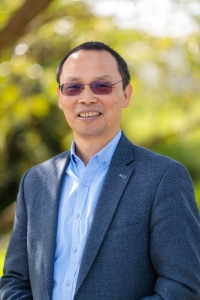
Photo: Reinhardt & Sommer
Fabian Machens
The synthetic biology division of Prof. Dr. Mueller-Roeber’s research group at the University of Potsdam is focused on tool development for various host organisms. This includes multi-gene cloning technologies, light controlled gene expression and recombination systems, synthetic transcription factors, as well as genome engineering approaches. Our tools, can be combined in order to tackle challenging projects that require heavily reprogrammed host cells, e.g. the production of high value secondary metabolites.
So far, we relied on Saccharomyces cerevisiae as the host organism for our synthetic biology approaches, but are also in the process of addressing other hosts like higher plants and the upcoming liverwort model Marchantia polymorpha.
Contact
Dr. Fabian Machens
University of Potsdam
Department of Molecular Biology
Karl-Liebknecht-Str. 24/25, Haus 20
14476 Potsdam, Germany
Phone: +49 (0)331 977-2650
E-Mail: fabian.machens(at)uni-potsdam.de
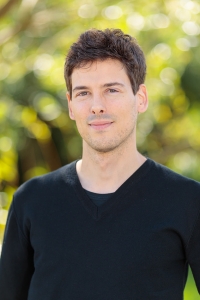
Photo: Reinhardt & Sommer
Sebastian Kersting
One of the main goals of the unit “Molecular Bio-Engineering” at the Fraunhofer Institute for Cell Therapy and Immunology, Branch Bioanalytics and Bioprocesses (Fraunhofer IZI-BB) is the implementation of natural biological processes and systems into artificial architectures and strategies. The rise of multidrug resistant pathogens has become a global concern. For this reason, the use of antimicrobial peptides (AMPs) as novel bioactive molecules with a broad spectrum activity against microorganisms and therefore offering an alternative to the intensive use of antibiotics, have been discussed. In various joint research projects at our unit, practicable and suitable strategies identifying novel AMPs and adapting naturally occurring AMPs were investigated, established and optimized. Suitable methodologies for the characterization and alteration of AMPs have been generated and based on the findings it is possible to manufacture customized, very short, artificial and non-toxic peptides (“synthicides”). Furthermore covalent and non-covalent surface immobilization strategies were identified and improved to avoid microorganism accumulation, cross-contamination and biofilm formation on solid materials. The immobilization of AMPs allows generating antimicrobial surface coatings with biocompatible properties for medical implants, ophthalmic devices and other applications (e.g. in agriculture, wound healing, etc.).
Contact
Sebastian Kersting
Fraunhofer Institute for Cell Therapy and ImmunologyBranch Bioanalytics and Bioprocesses (Fraunhofer IZI-BB)
Am Muehlenberg 13
D-14476 Potsdam
Phone: +49 (0)331 58187 214
E-Mail: sebastian.kersting(at)izi-bb.fraunhofer.de
Stephan Schilling
Under the umbrella of the Fraunhofer Institute for Cell Therapy and Immunology, the Department of Drug Design and Target Validation develops new molecular therapies for neurodegenerative and inflammatory diseases. Holding a key role in this assignment, the Protein and Drug Biochemistry Unit’s expertise lies in the purification of bacterial, plant and animal proteins, target proteins and their chemical and enzymological characterization. Applied methods range from protein chromatography to spectroscopic analysis of protein structure and mechanisms of enzyme functions. The unit’s competence also encompasses the isolation and characterization of antibodies aiming at developing protein drugs as well as their semi-preparative extraction. The subsequent structure-activity-analysis as well as structure-based molecular optimization complement the unit’s portfolio.
Contact
Dr. Stephan Schilling
Arbeitsgruppenleiter Protein- und Wirkstoffbiochemie
Fraunhofer-Institut für Zelltherapie und Immunologie
Weinbergweg 22
06120 Halle (Saale)
Phone:+49 (0)345 131428-15
E-Mail:

Holger Cynis
Embedded in the Fraunhofer Institute for Cell Therapy and Immunology, the Department of Drug Design and Target Validation develops new molecular therapies for neurodegenerative and inflammatory diseases. The Unit Molecular Biotechnology contributes to this objective by generating pharmacologically relevant in vitro and in vivo models, developing and establishing cellular and molecular assay systems. The methods comprise cell-based assays, analysis of gene expression, immunological methods, protein biochemistry, complex cell culture models as well as animal experiments. The unit further provides service for cellular compound screening such as efficacy, toxicity and transport. In addition, a main focus is on determining the pharmacology of test compounds in vivo and on establishing and validating animal models for the investigation of the enzyme functions.
Contact
Dr. Holger Cynis
Arbeitsgruppenleiter Molekulare Biotechnologie
Fraunhofer-Institut für Zelltherapie und Immunologie
Weinbergweg 22
06120 Halle (Saale)
Phone: +49 (0)345 131428-35
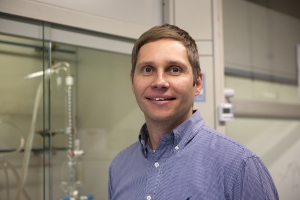
Marta Wieczorek – Poster Presentation Winner
Contact
Charité – Universitätsmedizin Berlin
Campus Virchow Klinikum
Institut für Laboratoriumsmedizin
Klinische Chemie und Pathobiochemie
Augustenburger Platz 1
D-13353 Berlin, Germany
Phone: +49 (0)30/450-569066
glyXera
glyXera – awarded with the Innovation Price of the bioregions Germany – is specialist provider of high-performance glycoanalysis, with services and products customizable to meet specific customer demands through using cutting edge methods and tools.
Clients include the world’s leading pharmaceutical, biotechnology and food companies.
The company is the exclusive provider of glyXboxTM, a high-performance glycoanalysis system.
Our expertise guides clients toward improved decision-making, also boosting and increasing the speed of discovery phases, research and development (R&D), clinical trials, and eventual approval of products such as vaccines and biopharmaceuticals.
Our stringent quality management solutions and operation protocols enable analyses to be replicated at the highest level, with transparency throughout all processes.
glyXera provides GLYCOANALYTICAL PRODUCTS & SERVICES and CUSTOMIZED GLYCOANALYSIS SOLUTIONS
glyXera is a Max Planck Society spin-off, with offices and labs in Magdeburg, the state capital of Saxony-Anhalt.
Contact
Dr. Erdmann Rapp
CEO & CSO
glyXera GmbH
Leipziger Strasse 44 * ZENIT / Haus 65
D-39120 Magdeburg, Germany
Phone: +49(0) 391 6117 251
Mobile: +49(0) 170 3700 830
Fax: +49(0) 391 6117 255
E-;ail: e.rapp@glyxera.com
Web: www.glyxera.com
UGA Biopharma GmbH
UGA Biopharma is a Germany-based, service provider for the development of Biosimilar and New Biological Entities (NBEs). A longstanding expertise in cell line development, bioprocess optimization, downstream development and analytics makes UGA to the leading supplier for several international biopharmaceutical companies.
Contact
Dr. Lars Kober
UGA Biopharma GmbH
Neuendorfstraße 20a
16761 Hennigsdorf, Germany
Phone: +49 (0)3302 20 24 904
Fax: +49 (0)3302 20 24 901
E-Mail: kober@ugabiopharma.com
Web: www.ugabiopharma.com
Analytik Jena AG
Analytik Jena is a leading provider of high-end analytical measuring technology, of instruments and products in the fields of biotechnology and molecular diagnostics, as well as of high quality liquid handling and automation technologies. Its portfolio includes traditional analytical technology, particularly to measure concentrations of elements and molecules, as well as systems for bioanalytical applications in the Life Science area spanning the highly complex analytic cycle of a sample from sample preparation to detection. Automated high-throughput screening systems for the pharmaceutical sector are also part of this segment’s extensive portfolio. Analytik Jena´s products are focused to offer customers and users a quality and the reproducibility of their laboratory results. Services, as well as device-specific consumables and disposables, such as reagents or plastic articles, complete the Group’s extensive range of products. Analytik Jena is part of the Swiss Endress+Hauser Group.
Contact
Diana Jahnke
Beratung und Vertrieb Life Science
Analytik Jena AG
Konrad-Zuse-Strasse 1
07745 Jena, Germany
Phone: +49 (0)3641 77-9423
Mobile +49 (0)176 17777 180
Fax: +49 (0) 36 41 77-92 79
E-Mail: diana.jahnke@analytik-jena.de
Website: www.analytik-jena.com


